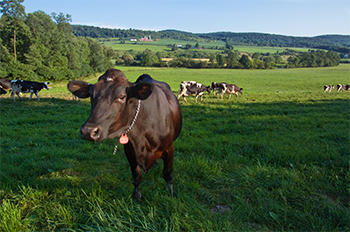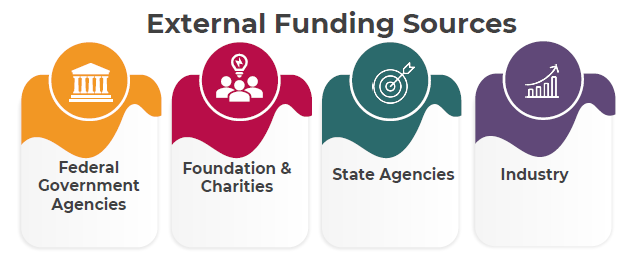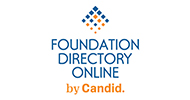A majority of the research conducted at Cornell University is funded by sponsors that support research, training, and services through a variety of agreements. To maximize your likelihood of success in obtaining funding, choose a funding source and mechanism that best matches the topic, scope, and budget of your proposed research, as well as your career level.
|
|
Tip: If you're on Cornell's network, the system identifies you automatically. If searching from home, use your Cornell email address. WATCH GrantForward Webinar - Using GrantForward as a Research (March 20, 2024) |
|
|
|
|---|
Grants.gov
- Subscribe to receive email notifications of federal grant opportunities based on your saved searches or other criteria. Other subscription options include updates on specific opportunities and all new grant opportunities.
Other Resources
- DOE Office of Science Funding Opportunities
- DOE Portfolio Analysis and Management System (PAMS) - find DOE-awarded projects and funding information
- NIH Reporter - find NIH-awarded projects and funding information
- NSF Award Search - find NSF-awarded projects and funding information
| Sponsor | Opportunities | Overview | Funding Announcement Subscription Service | Program & Informational Updates |
|---|---|---|---|---|
| Department of Energy | DOE Office of Science Announcements
| Overview | RSS Feed | The DOE often announces FOAs that have very short submission timelines and are frequently limited submission. If you are interested in submitting to a limited submission FOA, please contact Cornell Limited Submissions. |
| Environmental Protection Agency | EPA Funding Search | Overview | ||
| National Aeronautics and Space Administration | All NASA solicitations | Overview | Planetary Science updates | |
| National Endowment for the Arts | NEA Grants | Email or social media | ||
| National Endowment for the Humanities | NEH Grants Search | RSS Feed | ||
| National Institutes of Health | RSS Feed | |||
| National Science Foundation | NSF Funding Search | |||
| U.S. Department of Agriculture, National Institute of Food and Agriculture (NIFA) | Overview | Subscribe to updates |
Private foundations are an important source of support for academic research. Below are some resources to help you find funding opportunities from foundations.
Top Foundation Funders at Cornell
- American Cancer Society
- American Chemical Society
- American Heart Association
- American Kennel Club - Canine health
- Ford Foundation
- Gates Foundation Grand Challenges and General Grant Opportunities
- Jacobs Foundation Fellowships - Child and youth development
- MacArthur Foundation
- Morris Animal Foundation (Grants and Veterinarians & Students) – Veterinary Medicine
- Robert Wood Johnson Foundation - Building a culture of health
- Russell Sage Foundation - Social Science research
- Simons Foundation - Basic Science and Mathematics
- Sloan Foundation - Research and education in STEM and economics
- Spencer Foundation - Improving education around the world
- Winn Foundation - Feline health
William T. Grant Foundation - Improving the lives of young people in the U.S.
As part of our efforts to monitor the funding landscape and facilitate strategic planning, we coordinate with several resources. Hanover Resources has produced a 2026 Hanover Grants Calendar that reviews upcoming grant opportunities focused on Non-Federal Research, covering a range of disciplines and focus areas. Short-term targets with set deadlines are included alongside longer-term opportunities expected over the next year and beyond. Click here to access the calendar.
Tips for Writing Proposals for Foundation Grants
- Research and make the right fit.
- One of the most common reasons applications are rejected is not fitting with the funder's interests, goals, and priorities.
- Tailor your proposal to the specific funder's guidelines and interests.
- Funders really want to know:
- How will they benefit from investing in your research program? How will it help them achieve their goals?
- Why should they care? (The "so what?" factor.)
- Why are you the best one to do the work?
- How will you sustain the work after the funds are gone?
- Write an Executive Summary.
- Even if it's not required by a funder, an Executive Summary is good to have on-hand to share with potential funders and program managers. It should be clear and concise, and grab the reader's attention immediately.
Resources to help find NYS funding opportunities:
New York State’s online grant application and contract management system: NYS GRANTS GATEWAY
- Primary outlet of competitive NYS agency funding opportunities.
- Cornell is a prequalified grantee. No subscription necessary.
- To receive funding announcements by email, subscribe here.
Top Cornell NYS Funding Agencies
- Department of Agriculture & Markets

- Department of Environmental Conservation
- Department of Health
Includes an email sign up for updates - Developmental Disabilities Planning Council (DDPC)
- Education Department
- Empire State Development (includes NYSTAR, NYSED, ESD, Economic Development)
- New York City Department of Design and Construction (DDC): Town and Gown
- New York State Energy Research and Development Authority (NYSERDA)
- Office of Children and Family Services (OCFS)
- Office of Temporary and Disability Assistance (OTDA) Procurements and Grants & Contracts
- Parks and Recreation (including Zoos, Botanic Gardens and Aquariums, ZBGA)
Limited submission funding opportunities are overseen by Research and Innovation and managed by the Research Development (ReD). If faculty, students or staff become aware of a limited submission opportunity, they should contact OVPRI Limited Submissions before anything is submitted to the sponsor. See more on the Limited Submissions page.
 Contact the Research Development team for help using any of these resources.
Contact the Research Development team for help using any of these resources.
Join the CU-RES-ADMIN mailing list to receive funding opportunities and other research-related announcements.





